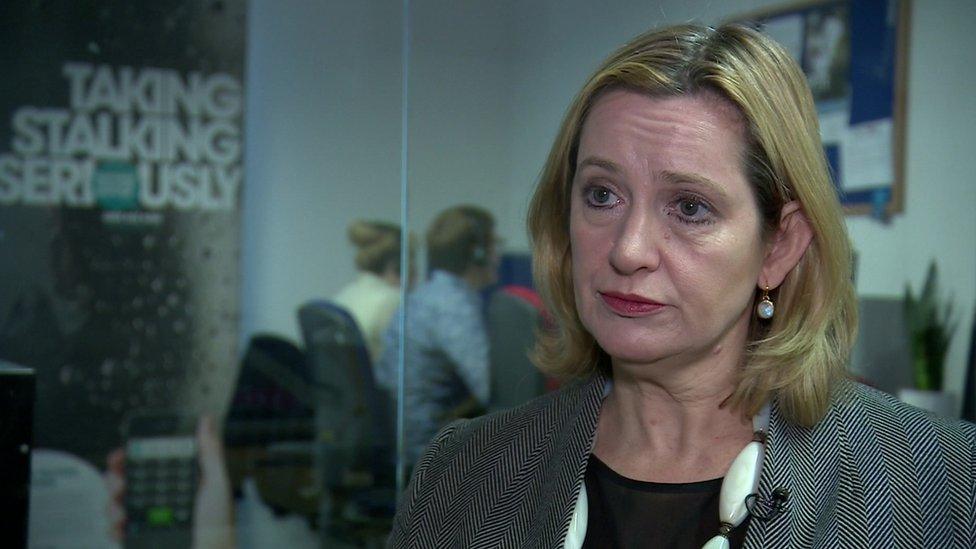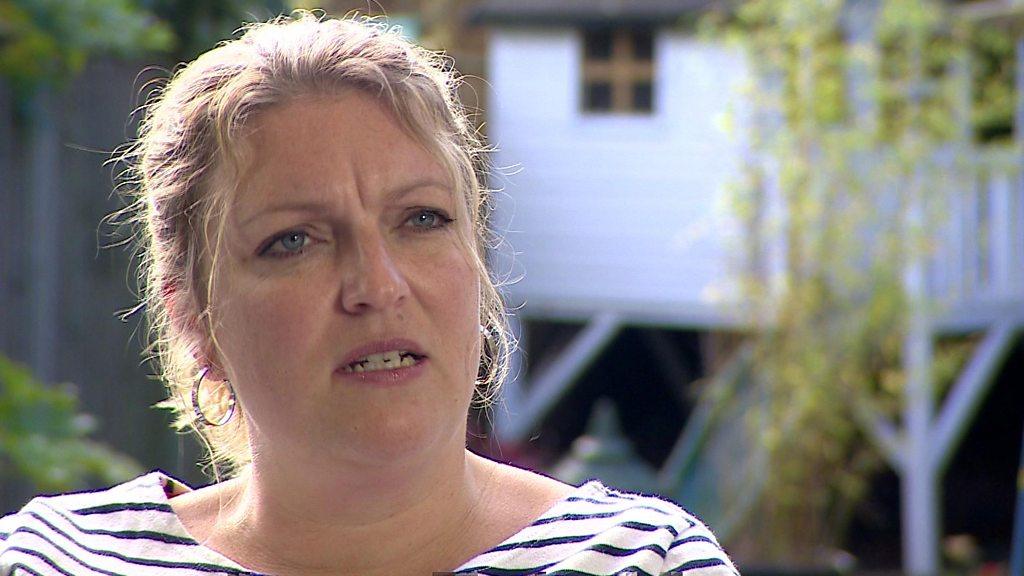Stalking: New orders planned to give quick protection
- Published

Home Secretary, Amber Rudd, has announced the new orders
New stalking protection orders will be introduced to better protect victims at the earliest possible stage, the home secretary has announced.
Amber Rudd called it "a practical solution to a crime taking place now".
The orders in England and Wales will help those who are targeted by strangers, giving them similar protection to domestic abuse victims.
Breaching an order's conditions will be a criminal offence with a maximum sentence of five years in jail.
Police will be able to apply to the courts for an order before a stalking suspect has been convicted or even arrested.
The requirements of the order will vary according to the nature of the case. Typically, the suspect will be banned from going near the victim and contacting them online.
They might also be ordered to attend a rehabilitation programme, or undergo treatment if they have a mental health problem.
The announcement is part of a set of measures to prevent violence against women and girls (VAWG).
The National Stalking Helpline has already dealt with more than 3,550 calls this year.
The new orders will offer protection for anyone who has not been in an intimate relationship with their stalker, helping those targeted by strangers, acquaintances or colleagues, as well as professionals such as doctors who may be targeted by patients.
Rachel Griffin, director of the Suzy Lamplugh Trust which manages the National Stalking Helpline, welcomed the announcement.
"We are really excited that the order allows positive obligations to be put on a stalker," Ms Griffin said.
"But of course that mental health treatment needs to be available at local level."
Early intervention
The orders will provide the same protection as that offered to victims of domestic abuse and will be available whether or not there are ongoing criminal proceedings.
If a prosecution is going ahead, the order can protect victims while evidence is being collected.
The orders follow legislation introduced in 2012 which made stalking a specific criminal offence in England and Wales.
In Scotland, stalking is illegal under the Criminal Justice and Licensing (Scotland) Act 2010 and in Northern Ireland it is prohibited under the Protection from Harassment Order (NI) 1997.
The National Police Chiefs' Council's lead for stalking and harassment, Assistant Chief Constable Garry Shewan, said:"We want to stop stalkers in their tracks.
"The launch of stalking protection orders will help us intervene earlier and place controls on perpetrators to prevent their behaviour escalating while the crime is investigated."
Ms Griffin said the success of the orders would rest on the ability of frontline officers to recognise stalking.

Stalking statistics:
One in five women and one in ten men will be affected by stalking in their lifetime
According to the Crime Survey for England and Wales 4.6% of women and 2.7% of men aged 16-59 were victims in 2015/16 alone
The National Stalking Helpline has responded to almost 14,000 calls since it was established in 2010, with over 3,550 so far in 2016
In the year to June 2016, the police recorded 4,168 stalking offences, an increase of 32% since the previous year (3,166)
There were a record 12,986 CPS prosecutions for stalking and harassment in 2014-15, the highest volume ever recorded
Of these, 1,103 prosecutions commenced under the new stalking offences

Stalking protection orders form part of a package of government action to coincide with 16 days of action, external following the 25 November International Day for Elimination of Violence Against Women.
A new £15 million fund will boost local provision of VAWG services to promote and embed the best local practice.
The VAWG Service Transformation Fund, running over three years, will be open to Police and Crime Commissioners, local authorities and health commissioners to support community-based services and promote best practice.
They will be encouraged to make joint bids for funding with women's charities and VAWG service providers to encourage a joined-up approach with a focus on early intervention as well as crisis response.
The government has said it will seek to legislate to introduce the orders as soon as parliamentary time allows.
- Published28 October 2016

- Published19 April 2016

- Published25 November 2012
